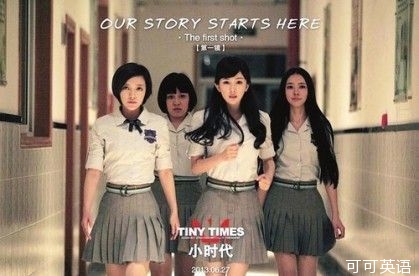
The hottest movie in China these days, "Tiny Times," puts the spotlight on the much-criticized "me generation" born after 1990s and the gap between them and everyone else.
中國(guó)這些天最熱門(mén)的電影《小時(shí)代》把焦點(diǎn)集中在1990年之后出生的飽受批評(píng)的“以自我為中心的一代人”以及他們和其他人之間的代溝。
The domestic coming-of-age film set in Shanghai even eclipsed the Hollywood blockbuster "Man of Steel," demonstrating that China's young audience prefers homegrown dramas they can relate to.
這部設(shè)在上海的國(guó)內(nèi)關(guān)于成長(zhǎng)的電影甚至超過(guò)了好萊塢大片《鋼鐵俠》,證明中國(guó)的年輕觀眾更喜歡與他們有關(guān)的國(guó)產(chǎn)劇。
It also broke the record for first-day box office in China.
它還打破了中國(guó)的首日票房紀(jì)錄。
"Tiny Times" ("Xiao Shi Dai") has also generated a storm of controversy, with critics calling it trash that glorifies immorality and materialism.
《小時(shí)代》也產(chǎn)生了極大的爭(zhēng)議,批評(píng)家稱(chēng)之為垃圾,美化了不道德和物質(zhì)主義。
It's filled with luxury brands of fashion and cars, as well as beautiful people, splendid venues and desirable men who can afford to shower gifts on women. There are plenty of romantic entanglements that strain the women's friendships.
電影充滿(mǎn)了時(shí)尚奢侈品牌和豪車(chē),以及俊男美女、奢華的場(chǎng)所、可以給女人買(mǎi)各種禮物的理想男人。有很多歪曲女性友誼的浪漫糾葛。
The visuals are beautiful and there's a lot of voiceover in which the women talk about what they want, such as true friendship, love and dream.
視覺(jué)效果很漂亮,有很多畫(huà)外音是女人談?wù)撍齻兿胍臇|西,如真正的友情、愛(ài)情和夢(mèng)想。
Director Guo Jingming, who is also the bestselling novel's author, says it is really a movie about youthhood and one intended to inspire young people to pursue their dreams, like the protagonists, some wealthy, some poor. But many critics blame him for exploiting the word "dream" while they consider the movie's focus the glamorous lifestyle that most young audience can't afford.
導(dǎo)演郭敬明,他也是這本最暢銷(xiāo)小說(shuō)的作者,說(shuō)這是一部真正關(guān)于青春的電影,一部旨在鼓勵(lì)年輕人去追求他們夢(mèng)想的電影,就像主角一樣,有些很富有,有些很貧窮。但許多批評(píng)者指責(zé)他利用“夢(mèng)想”一詞,他們覺(jué)得電影聚焦的是大多數(shù)年輕觀眾負(fù)擔(dān)不起的奢華生活方式。
Anyone who likes or praises it is immediately labeled jiu ling hou or post-1990s generation. Critics, including many famous directors and critics, are denounced by young fans. "They are getting too old to understand the beauty of youth and dreams," one person commented on the weibo microblog.
那些喜歡或稱(chēng)贊它的人立即貼上90后的標(biāo)簽。批評(píng)者,包括許多著名的導(dǎo)演和評(píng)論家,被年輕的影迷所指責(zé)。“他們太老了,難以理解青春和夢(mèng)想的美麗”,一個(gè)人在新浪微博上發(fā)表評(píng)論說(shuō)。
The movie raked in more than 100 million yuan (US$16.3 million) in two days and is now hitting 300 million yuan in little more than a week.
電影票房?jī)商?億多元(1630萬(wàn)美元),現(xiàn)在不超過(guò)一個(gè)星期已經(jīng)達(dá)到3億元。
Guo has said he didn't want to direct it at first, "but we looked all over the country and couldn't find anyone fit to direct it," he says.
郭敬明說(shuō)他一開(kāi)始不想導(dǎo)演它,“但我們找遍了整個(gè)國(guó)家,找不到任何適合的人來(lái)導(dǎo)演它,”他說(shuō)。
"We don't really have any movies that target the post-1990s generation, the young people are a major force today. It will be too late if we don't start making movies for them," Guo adds.
“我們確實(shí)沒(méi)有任何針對(duì)90后的電影,年輕人是今天的主力。如果我們不開(kāi)始為他們制作電影,這將是太遲了,“郭敬明補(bǔ)充說(shuō)。
The timing of release is perfect - the target audience are students who are beginning their summer holiday.
上映時(shí)機(jī)是完美的——目標(biāo)受眾是開(kāi)始放暑假的學(xué)生。
China's film market once was dominated by big-budget, historic spectacle movies by famed directors such as Zhang Yimou and Chen Kaige.
中國(guó)的電影市場(chǎng)曾經(jīng)是大制作占據(jù)主導(dǎo)地位,著名導(dǎo)演如張藝謀和陳凱歌的歷史奇觀電影。
In the last two years, that pattern has been broken and medium- to low-budget films made a big entrance and, to everyone's surprise, topped the box office in 2012.
在過(guò)去的兩年里,這種模式已經(jīng)被打破,中-低成本電影找到了大的突破口,讓大家都感到吃驚的是2012年票房登頂。
The small-budget, tacky comedy "Lost in Thailand" was considered a phenomenon, as was "So Young," a small-budget nostalgic film about youth.
低成本的接地氣喜劇《泰囧》被認(rèn)為是一種現(xiàn)象,正如《致青春》是低成本的關(guān)于青春的懷舊電影。
Critics have long been saying China needs more small- and medium-budget films that people can relate to.
評(píng)論人士一直說(shuō)中國(guó)需要與人們相關(guān)的中小成本的電影。


